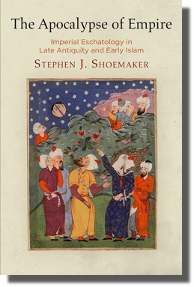Review of Qur’anic Research, Vol. 6 no. 7 (2020)
 In the latest installment of the Review of Qur’anic Research (Vol. 6, no.7), Michael E. Pregill (University of California, Los Angeles) reviews Stephen Shoemaker’s The Apocalypse of Empire: Imperial Eschatology in Late Antiquity and Early Islam (Philadelphia, PA: University of Pennsylvania Press, 2018).
In the latest installment of the Review of Qur’anic Research (Vol. 6, no.7), Michael E. Pregill (University of California, Los Angeles) reviews Stephen Shoemaker’s The Apocalypse of Empire: Imperial Eschatology in Late Antiquity and Early Islam (Philadelphia, PA: University of Pennsylvania Press, 2018).
 In his review, Pregill writes “Stephen Shoemaker’s The Apocalypse of Empire builds upon the methodology, and some of the most provocative conclusions, of the author’s earlier monograph The Death of a Prophet.[1] In that book, Shoemaker subjects the extant evidence concerning Muḥammad’s death to close scrutiny, concluding that the Prophet died after the invasion of Palestine commenced in 634 CE and not before, as most accounts hold. Even more shockingly, Shoemaker asserts that Muḥammad preached a fervently eschatological message and led his followers in a campaign to conquer Jerusalem as the focal point of an imminent apocalyptic culmination of history. One of the most compelling features of The Death of a Prophet is Shoemaker’s deployment of a methodology and framework drawn from the study of early Christianity in order to show how the overtly eschatological message of the original movement that followed Muḥammad was radically rewritten in the course of just a few decades, forever altering the meaning and thrust of Islam in its formative period…”
In his review, Pregill writes “Stephen Shoemaker’s The Apocalypse of Empire builds upon the methodology, and some of the most provocative conclusions, of the author’s earlier monograph The Death of a Prophet.[1] In that book, Shoemaker subjects the extant evidence concerning Muḥammad’s death to close scrutiny, concluding that the Prophet died after the invasion of Palestine commenced in 634 CE and not before, as most accounts hold. Even more shockingly, Shoemaker asserts that Muḥammad preached a fervently eschatological message and led his followers in a campaign to conquer Jerusalem as the focal point of an imminent apocalyptic culmination of history. One of the most compelling features of The Death of a Prophet is Shoemaker’s deployment of a methodology and framework drawn from the study of early Christianity in order to show how the overtly eschatological message of the original movement that followed Muḥammad was radically rewritten in the course of just a few decades, forever altering the meaning and thrust of Islam in its formative period…”
Want to read more? For full access to the Review of Qur’anic Research (RQR), members can log in HERE. Not an IQSA member? Join today to enjoy RQR and additional member benefits!
© International Qur’anic Studies Association, 2020. All rights reserved.
